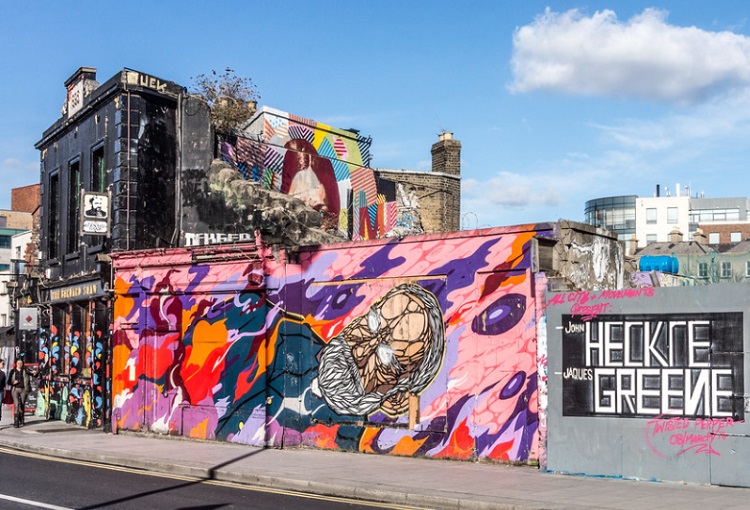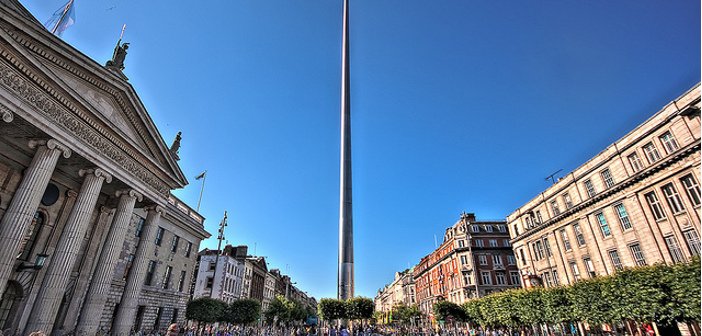Cultural Rejuvenation Must Not Only Be For the Privileged
Fury at the homogenisation of Dublin City only grows more intense. It’s increasingly difficult to ignore the old town slowly metamorphosing into a soulless shell, more a commercial district than a city, fewer residents on its streets, no culture to speak of. (Well, you could ignore these concerns if you were part of the outgoing government, but you know what I mean.)
On the closure of The Bernard Shaw in Portobello, dishonest editorials mocked the response as hysteria, as though the disgust was sparked solely by the closure of a popular hideout. But as important as the Shaw was to a strand of Dublin beatniks, musicians and glorious weirdos, this is not about a single building – it’s about the sustained, methodical attempt to squeeze the life out of the capital with no indication that a tipping point has been reached.
The writing was on the wall when An Bord Pleanála refused to renew the lease on the Shaw’s smoking area on the tough-to-swallow grounds that it was “inconsistent with the emerging pattern of development in the vicinity”. When battle lines are drawn between business and culture, the almighty euro wins every day of the week.

As reported by the Dublin Inquirer last May, some nearby residents on South Richmond Street were issued notices to leave as landlords declared they wanted to renovate. Then a group of men were deployed into one of the homes and left with the doors. It’s hard to read such brutal detail and not conclude that this is how the relentless gentrification of a Dublin neighbourhood plays out.
Dismay with the current situation has led to a mobilisation. There’s a hunger to funnel the collective sense of grief felt for the Shaw’s demise into something greater. Give Us The Night, a volunteer group lobbying for changes to nightlife in Ireland, has argued for the protection of “special spaces” like the Shaw. But such change is completely at odds with Fine Gael’s economic and social model that seemingly demands that business be prioritised first, second and third. Any initiative not entirely focused on its bottom line is as invisible to the party as the air.
With election canvassing underway, you can now speak directly to politicians about issues important to our campaign. Click into image or via this link for pointers on what to ask: https://t.co/9adFhDLE8c #giveusthenight #nighttimeeconomy #irishnightlife #irishculture #GE2020 pic.twitter.com/fhuSK5xtUq
— Give Us The Night (@GiveUsTheNight) January 14, 2020
One thing can’t be lost among the anger: any push for cultural rejuvenation must attend to an issue that has eternally dogged the arts in the country – the barriers to access for many minority and disadvantaged communities.
Culture and nightlife have always been more welcoming realms for people of social and economic privilege. Any attempts to revitalise these worlds should remember that local scenes should be driven by a sense of community and solidarity. What kind of vibrant cultural endeavour locks out asylum seekers, the homeless, the travelling community and the economically repressed?
Dublin City, you won’t be surprised to hear, is expensive – the most expensive city in the Eurozone, in fact. Inventive nightlife, where the financial margins may be tight, is always going to struggle to gestate in this atmosphere, but a bar that can attract enough people with enough scratch to order €15 cocktails all night stands a decent chance of thriving. Simple economics creates a tiered system where people who are financially squeezed are alienated. It’s simply not viable to regularly participate if you’re living cheque to cheque.

Prejudices are also pervasive. Stories of people of colour and travellers feeling mistreated by pubs and clubs, or targeted by bouncers, are commonplace and in-line with more wider reports of racism that stain society. The instances that actually end up in court are just a drop in the ocean. No manifesto to improve Dublin nightlife should be without a provision to make the city fully inclusive.
Other cities have taken more proactive steps to preserve their culture. In Berlin, the famous nightclub Berghain was awarded a reduced tax rate by German courts that deemed the venue should receive the same cultural status as institutes often (snobbishly) deemed to have more artistic weight, such as opera houses and theatres.
This was not an unwelcome decision. But Berghain has the reputation for being Berlin’s most exclusive club – a playground for the glitterarti. So instead, it’s local groups that have taken it upon themselves to organise more inclusive nights.
Room 4 Resistance is a Berlin-based queer femme and non-binary collective that runs intersectional and sex-positive queer raves, and has organized nights that explicitly welcome refugees and members of the Roma community. One of its promoters, Luz Diaz, has in the past reached out to Schwulen Beratung, a center for queer refugees in Berlin, to invite residents to parties.
Similarly, there have been efforts in Dublin to counter the system with events that specifically cater to underprivileged communities. Take Black Jam, which after some successful shows at Fibber Magees moved to The Abbey Theatre last September. The Afro diaspora music night offered free tickets to asylum seekers and homeless people, plus complimentary transport to and from Direct Provision centres. The Abolish Direct Provision Campaign has organised cultural events to raise money and awareness for their cause that has allowed residents and non-residents to mingle side-by-side.
Proof that this actually happened. It might even still be up. I'm not sure! pic.twitter.com/QRUH6xPNxE
— Kwoo (@kwoovo) September 8, 2019
Capitalism has programmed into us the idea that social activity as a luxury. But stifling access to such activities has several ill effects. The Irish Refugee Council has asserted that Direct Provision residents spend long periods in inactivity, often leading to depression and social isolation, while current and former residents have spoken about how the lack of freedom frays at their mental health. Like everyone else, the opportunity for socialising goes a long way.
I must say at this point to say that in the harsh atmosphere, there are still some thriving creative movements. Take Dublin’s electronic and hip-hop scenes – two genres enjoying a surge of inventiveness, where innovators are doing amazing things in homemade recording studios and the depths of the city’s underground venues. But these micro-scenes are fragile. Their embattled leaders can’t be tasked with the responsibility of imposing huge societal changes.
Events like Black Jam have relied on the drive of organisers willing to fight against the tide. They are important if only to make people aware of the need for cultural gatherings for the homeless and people living in direct provision. But it’s legislative change, support at government level, the prioritisation of nightlife and the acceptance that a city can’t express its uniqueness without its creatives, that is ultimately required. As culture slips away from the masses one venue at a time, those at the bottom of our society sink further into the quicksand. We shouldn’t have to rely on the ingenuity of individuals to pick up the slack.
